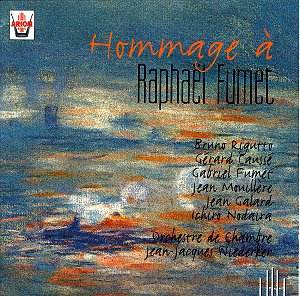This recording has a strong family flavour about it;
the featured composer Raphaël Fumet was the son of an important
19th century French musician, the wonderfully-named Dynam-Victor
Fumet, while Raphaël’s son, the flautist Gabriel Fumet, seems to
have been the moving force behind this disc.
Fumet’s music can fairly be described as conservative,
though this is not intended pejoratively. It is influenced by great
figures of late Romanticism – Rachmaninov and Ravel seem to me to loom
very large – rather than, as one might expect given Fumet’s dates, either
Les Six or the French avant-garde. In fact, the first two pieces on
the disc – the piano piece ‘L’Ange des Bois’ and the viola solo
‘Lacrimosa’ - start further back still, the first echoing Chopin
in the piano textures, and the second suggesting Brahms with its dignified
unfolding melody. Both, though, soon leave stylistic allusions behind,
and present us with a composer who was very much his own man. Many of
the harmonic touches in Lacrimosa are most beautiful, as is the
sympathetic writing for the solo instrument. I would strongly recommend
this piece to viola players, whose repertoire is not as tightly packed
as those of the violin and 'cello. This, together with the more straightforwardly
melancholy Barcarolle, is given a highly affecting performance
by Gérard Caussé, sensitively accompanied by Ichiro Nodaïra.
Although short, the Toccata for organ solo is
a stunner! A brilliant and exciting piece, it has the physical exuberance
of the best 20th century French organ music. The busy figuration
and striding bass melodies naturally evoke Widor, yet the music has
real grit, with scrunching dissonances that resolve into a splendid
culminating concord. It is very frustrating that there are no details
of any kind on the disc regarding dates or venues of these recordings.
The Toccata was certainly recorded in a large church, as the
final reverberation continues for at least six seconds! I wonder was
it recorded at the Church in Angers where Fumet was organist for many
years? We should be told! The standard of recording throughout is highly
acceptable, both in the solo items and in La Nuit for string
orchestra. I’m tempted to describe this piece as Transfigured Night-lite,
but that would actually be unfair (though not a million miles from the
truth!). It is, anyway, the most progressive, or the least conservative
of the works here recorded, and contains some glorious writing for the
strings.
The Ode Concertante for flute and piano is the
largest-scale work on the disc. This is challenging stuff, not least
for the flautist, who has to have complete command of the extremes of
his instrument’s range. Given that this work was composed for Fumet’s
son Gabriel, who performs it here, one can take stylistic authenticity
for granted, and be suitably impressed by the sheer virtuosity of Fumet
fils. This is no ‘mere’ display piece, though; on the contrary,
it is a most thoughtfully created and originally laid-out composition.
Fumet juxtaposes impressionist passages, unaccompanied cadenzas for
the flute, fluttering agitato music and much else, all coalescing
in a simple and convincing conclusion.
La Rose for solo violin completes this enjoyable
and unusual programme. This may not be music to take the world by storm.
But it is emphatically worth both playing and hearing. The fact that
Fumet himself apparently heard so very little of it in his lifetime
makes this issue all the more touching a tribute to his art.
Gwyn Parry-Jones

![]() Bruno Rigutto, piano, Gérard Caussé, viola,
Gabrielle Fumet, flute, Jean Mouillère, violin, Jean Galard, organ,
Ichiro Nodaïra, piano, Chamber Orchestra/Jean-Jacques Wiederker,
Anne Wiederker, solo violin
Bruno Rigutto, piano, Gérard Caussé, viola,
Gabrielle Fumet, flute, Jean Mouillère, violin, Jean Galard, organ,
Ichiro Nodaïra, piano, Chamber Orchestra/Jean-Jacques Wiederker,
Anne Wiederker, solo violin ![]() ARION ARN 68475 [60:26]
ARION ARN 68475 [60:26]